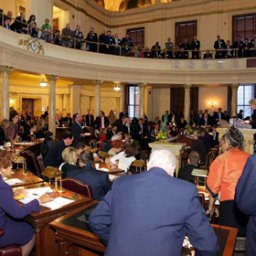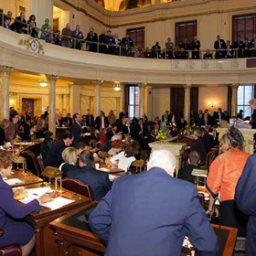
Would Create Escalating Penalties to Reflect Danger of Texting While Driving
TRENTON – Legislation sponsored by Senators Richard J. Codey (D – Essex, Morris) and Fred Madden (D – Gloucester, Camden) that would address the epidemic of hands-free violations by drivers engaging in dangerous, and potentially lethal, distractions while behind the wheel today cleared the Senate Law and Public Safety Committee.
“New Jersey has appropriately tough laws on the books regarding drinking while driving. But penalties for texting while driving are a mere slap on the wrist, so now it is time for a slap in the face,” said Codey. “Considering that studies have shown that texting behind the wheel is just as dangerous, if not more dangerous, than getting behind the wheel drunk, an update of our hands-free cell phone law is long overdue. I hope that those groups that have traditionally advocated against drunk driving will also come out in force for this bill.”
The bill, S-69, would put in place a graduated penalty structure for repeat offenders who violate the state’s hands-free cell phone law more than once in a ten-year period – a motor vehicle violation that, under current law, carries a $100 fine for first and subsequent offenses. Under the bill, first-time offenders would have to pay a fine of $200. Drivers convicted of a second offense within 10 years of the first would have to pay a fine of $400, and drivers convicted of a third and subsequent offenses within 10 years of the first would have to pay a fine of $600 and face driver’s license suspension of up to 90 days. The fines would go towards a public information program about the dangers of texting while driving.
“This bill would put serious teeth in New Jersey’s hands-free cell phone law, and would make our efforts to combat distractions while driving the toughest in the nation,” said Madden. “We cannot sit idly by while drivers put themselves and others at risk by engaging in dangerous behavior behind the wheel. This bill sends the message – put down the phone and drive, or face the consequences.”
A 2010 Car and Driver Magazine report showed how long it took to hit the brake when sober (.54 seconds), drunk (add four feet), reading an e-mail (add 36 feet) and sending a text message (add 70 feet). The Transport Research Laboratory study showed that reaction times were 35% worse for drivers sending a text message, as opposed to 12% worse for those at the legal limit of intoxication and 21% worse for those under the influence of cannabis. A study prepared by the Virginia Tech Transportation Institute found that text messaging took drivers’ focus away for 4.6 seconds, and a Clemson University simulator study found that text messaging and using an iPod caused drivers to leave their lanes ten percent more often.
In addition, a study by the American Journal of Public Health noted that, if not for texting while driving, the number of deaths caused by distracted driving would have dropped every year from 2002 to 2007, from 4,611 deaths nationwide in 2001 to 1,925 in 2007. Instead, the study found a 19 percent increase in auto fatalities for every 1 million additional cell phone subscribers, and an increase to 5,870 deaths caused in 2008 due to distracted driving.
The bill now heads to the Senate Budget and Appropriations Committee.



